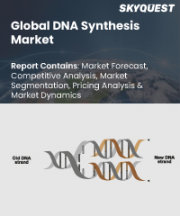
|
시장보고서
상품코드
1790354
효소 DNA 합성 시장 규모, 점유율, 동향 분석 리포트 : 서비스별, 최종 용도별, 지역별, 부문별 예측(2025-2033년)Enzymatic DNA Synthesis Market Size, Share & Trends Analysis Report By Services (Oligonucleotide Synthesis, Gene Synthesis), By Application (Synthetic Biology, Vaccine Development), By End Use, By Region, And Segment Forecasts, 2025 - 2033 |
||||||
효소 DNA 합성 시장 개요
세계의 효소 DNA 합성 시장 규모는 2024년에 2억 9,290만 달러로 추정되며, 2033년에는 24억 4,470만 달러에 달하며, 2025-2033년 CAGR은 26.65%로 확대할 것으로 예측됩니다. 기술 발전, 정밀의료에 대한 수요 증가, 합성 생물학 연구 증가, 유전자 연구 및 생명 공학에 대한 자금 지원 증가는 효소 DNA 합성 시장의 성장을 가속할 것으로 예측됩니다.
자동화 혁신으로 효소 DNA 적용 범위 확대
또한 혁신적인 의약품 개발 및 유전자 연구에 중점을 둔 바이오의약품 부문의 확장은 예측 기간 중 효소 DNA 합성 시장을 더욱 촉진하고 있습니다. 효소 DNA 합성은 분자 제조의 한계를 계속 넓혀가고 있으며, 최근 획기적인 발전은 기존 생명공학의 한계를 뛰어넘는 가능성을 보여주고 있습니다. PNAS에 게재된 선구적인 개발은 효소적 단일 염기 DNA 합성 및 시퀀싱을 디지털 마이크로플루이드와 통합한 DNA-DISK 플랫폼을 발표했습니다. 이 엔드 투 엔드 완전 자동화 시스템은 말단 데옥시뉴클레오티딜 전이효소(TdT)를 사용하여 DNA 사슬에 디지털 데이터를 암호화하여 기존의 합성 및 시퀀싱 워크플로우에 대한 합리적이고 확장 가능한 대안을 제시합니다. 이 플랫폼은 가혹한 화학물질을 배제하고 수성 환경에서 합성을 가능하게 함으로써 더 안전하고, 더 빠르고, 더 지속가능한 생산 방식으로의 전환에 부합하는 플랫폼입니다.
이 제품의 혁신성은 쓰기에서 읽기까지 전체 DNA 데이터 저장 사이클을 컴팩트하고 디지털로 제어되는 셋업 내에서 자동화할 수 있는 능력에 있습니다. 이 시스템의 효소적 정확성은 데이터를 정확하게 인코딩하는 데 필수적인 1염기 추가를 가능하게 합니다. 이번 개발로 효소적 DNA 합성은 특히 바이오인포매틱스나 디지털 아카이브와 같이 높은 처리량과 정확도가 요구되는 분야에서 분산형 합성 모델을 지원할 수 있는 유연한 툴로 강화될 것입니다. DNA Script, Molecular Assemblies, Ansa BIoTechnologies 등 이 부문의 기업은 이미 유사한 기술 방향을 추구하고 있으며, 첨단 및 용도별 합성 플랫폼에 대한 수요를 충족시키고 있습니다.
이러한 발전은 효소 합성 기술의 발전 범위와 상업적 가능성을 반영합니다. 소형화, 지속가능, 자동화 시스템에 대한 수요가 증가함에 따라 DNA-DISK와 같은 기술 혁신은 중요한 시장 기회를 제시하고 있습니다. DNA 기반 데이터 스토리지는 그 밀도, 수명, 환경 효율성이 높은 것으로 평가받으며 프론티어 기술로 주목받고 있습니다. DNA 서열을 자율적으로 합성하고 처리하는 능력은 새로운 공동 연구와 시장 확대의 문을 열고, 효소 합성을 합성 생물학, 데이터 사이언스, 분산형 바이오 제조에 걸친 차세대 분자 솔루션의 중요한 인에이블러로 자리매김할 것입니다.
합성생물학의 미래를 만들어가는 확장 가능한 DNA 혁신
효소적 DNA 합성(EDS)은 길이, 충실도, 환경적 지속성 등 오랜 기간의 한계를 극복하고 기존 화학적 방법을 대체할 수 있는 혁신적인 방법으로 빠르게 부상하고 있습니다. 포스포아미드 화학은 수십년간 DNA 합성을 지배해 왔지만, 누적 사이클의 비효율성과 높은 오류율로 인해 300개 이상의 염기서열을 효율적으로 생산하는 데 어려움을 겪어왔습니다. 반면, EDS는 말단 데옥시뉴클레오티딜 전이효소(TdT)를 사용하여 온화한 수성 조건에서 뉴클레오티드를 첨가하여 더 긴 DNA 단편의 고순도 합성을 가능하게 합니다. 이러한 기술적 역량의 도약은 유전체학, 유전자 편집, 합성생물학, mRNA를 이용한 의약품 개발 등 첨단 용도를 지원하는 데 있으며, 매우 중요합니다.
상업적 측면에서도 EDS로의 전환은 생명과학 부문 전체에 새로운 성장의 길을 열어주고 있습니다. 길고, 정확하고, 다양한 서열의 DNA 구조물을 신속하고 지속적으로 생산할 수 있는 능력은 고처리량 R&D 및 분산형 바이오 제조에 있으며, 경쟁력이 있습니다. 이러한 변화의 선구자인 개발 기업은 벤치탑 기기, 주문형 합성 서비스, 치료, 백신 개발, 차세대 바이오엔지니어링에 사용할 수 있는 얼리 액세스 프로그램을 제공함으로써 전략적 우위를 점하고 있습니다. 산업계에서는 반복 주기의 가속화, 외주 의존도 감소, 친환경 기술이 우선시되는 가운데, 효소 DNA 합성은 경쟁 구도를 재정의하고 진화하는 합성 생물학 생태계의 핵심으로 자리매김하고 있습니다.
목차
제1장 조사 방법과 범위
제2장 개요
제3장 효소 DNA 합성 시장 변수, 동향, 범위
- 시장 계통 전망
- 모시장 전망
- 관련/부수 시장 전망
- 시장 역학
- 시장 성장 촉진요인 분석
- 시장 성장 억제요인 분석
- 효소 DNA 합성 시장 분석 툴
- 산업 분석 - Porter의 산업 분석
- PESTEL 분석
제4장 효소 DNA 합성 시장 : 서비스, 추정·동향 분석
- 서비스 부문 대시보드
- 세계의 효소 DNA 합성 시장 서비스 변동 분석
- 세계의 효소 DNA 합성 시장 규모와 동향 분석(서비스별, 2021-2033년)
- 올리고뉴클레오티드 합성
- 유전자 합성
제5장 효소 DNA 합성 시장 : 용도별, 추정·동향 분석
- 용도 부문 대시보드
- 세계의 효소 DNA 합성 시장 용도 변동 분석
- 세계의 효소 DNA 합성 시장 규모와 동향 분석(용도별, 2021-2033년)
- 합성생물학
- 백신 개발
- 유전자 공학
- 기타
제6장 효소 DNA 합성 시장 : 최종 용도별, 추정·동향 분석
- 최종 용도 부문 대시보드
- 세계의 효소 DNA 합성 시장 최종 용도 변동 분석
- 세계의 효소 DNA 합성 시장 규모와 동향 분석(최종 용도별, 2021-2033년)
- 바이오의약품 기업
- 학술연구기관
- 계약 연구기관
제7장 효소 DNA 합성 시장 : 서비스, 용도, 최종 용도에 의한 지역별, 추정·동향 분석
- 지역별 시장 대시보드
- 시장 규모, 예측 동향 분석, 2021-2033년
- 북미
- 미국
- 캐나다
- 유럽
- 영국
- 독일
- 프랑스
- 이탈리아
- 스페인
- 노르웨이
- 스웨덴
- 덴마크
- 아시아태평양
- 일본
- 중국
- 인도
- 호주
- 한국
- 라틴아메리카
- 브라질
- 칠레
- 중동 및 아프리카
- 사우디아라비아
- 아랍에미리트
- 쿠웨이트
제8장 경쟁 구도
- 기업/경쟁 분류
- 전략 지도제작
- 기업 시장 현황 분석, 2024년
- 기업 개요/상장기업
- Telesis Bio Inc.
- Twist Bioscience Corporation
- GenScript BIoTech Corp.
- Evonetix
- Ansa BIoTechnologies, Inc.
- Camena Bio
- Molecular Assemblies
- DNA Script
- Touchlight
- Kern Systems
Enzymatic DNA Synthesis Market Summary
The global enzymatic DNA synthesis market size was estimated at USD 292.9 million in 2024, is projected to reach USD 2,444.7 million by 2033, expanding at a CAGR of 26.65% from 2025 to 2033. Owing to advancements in technology, rising demand for precision medicine, increased research in synthetic biology, and greater funding for genetic research and biotechnology are anticipated to drive the growth of the enzymatic DNA synthesis market.
Automation Breakthrough Expands Scope of Enzymatic DNA Applications
Moreover, the expanding biopharmaceutical sector, with its focus on innovative drug development and genetic research, is further propelling the enzymatic DNA synthesis market over the forecast period. Enzymatic DNA synthesis continues to push the boundaries of molecular manufacturing, with recent breakthroughs demonstrating its potential beyond traditional biotechnology. A pioneering development featured in PNAS introduces the DNA-DISK platform, which integrates enzymatic single-nucleotide DNA synthesis and sequencing with digital microfluidics. This end-to-end, fully automated system encodes digital data into DNA strands using terminal deoxynucleotidyl transferase (TdT), offering a streamlined and scalable alternative to conventional synthesis and sequencing workflows. By eliminating harsh chemicals and enabling synthesis in aqueous environments, this platform aligns with the global shift toward safer, faster, and more sustainable production methods.
The innovation lies in its ability to automate the entire DNA data storage cycle-from writing to reading-within a compact and digitally controlled setup. The system's enzymatic precision allows for single-base additions, essential for encoding data accurately. This development reinforces enzymatic DNA synthesis as a flexible tool that can support decentralized synthesis models, especially in domains that require high-throughput and precision, such as bioinformatics and digital archiving. Companies in the sector, including DNA Script, Molecular Assemblies, and Ansa Biotechnologies, are already pursuing similar technological directions to meet demand for advanced, application-specific synthesis platforms.
This advancement reflects the evolving scope and commercial potential of enzymatic synthesis technologies. As demand grows for miniaturized, sustainable, and automated systems capable of operating beyond genomic applications, innovations such as DNA-DISK signal a significant market opportunity. DNA-based data storage-valued for its density, longevity, and eco-efficiency-is gaining traction as a frontier technology. The ability to synthesize and process DNA sequences autonomously opens doors to new collaborations and market expansion, positioning enzymatic synthesis as a critical enabler of next-generation molecular solutions across synthetic biology, data science, and decentralized biomanufacturing.
Scalable DNA Innovation Reshaping the Future of Synthetic Biology
Enzymatic DNA synthesis (EDS) is rapidly emerging as a transformative alternative to traditional chemical methods, addressing long-standing limitations in length, fidelity, and environmental sustainability. While phosphoramidite chemistry has dominated DNA synthesis for decades, it struggles to efficiently produce sequences beyond 300 bases due to cumulative cycle inefficiencies and high error rates. In contrast, EDS uses terminal deoxynucleotidyl transferase (TdT) to add nucleotides under mild, aqueous conditions, enabling high-purity synthesis of longer DNA fragments. This leap in technical capability is crucial for supporting advanced applications in genomics, gene editing, synthetic biology, and mRNA-based drug development.
From a commercial standpoint, the shift toward EDS is unlocking new growth avenues across the life sciences sector. The ability to produce long, accurate, and sequence-diverse DNA constructs quickly and sustainably offers a competitive edge in high-throughput R&D and decentralized biomanufacturing. Companies pioneering this shift are gaining strategic traction by offering benchtop instruments, on-demand synthesis services, and early-access programs tailored for use in therapeutics, vaccine development, and next-generation bioengineering. As industries prioritize faster iteration cycles, reduced reliance on outsourcing, and greener technologies, enzymatic DNA synthesis is redefining the competitive landscape, positioning itself as a cornerstone of the evolving synthetic biology ecosystem.
Global Enzymatic DNA Synthesis Market Report Segmentation
This report forecasts revenue growth at global, regional, and country levels and provides an analysis of the latest industry trends in each of the sub-segments from 2021 to 2033. For this study, Grand View Research has segmented the global enzymatic DNA synthesis market report based on services, application, end use, and region.
- Services Outlook (Revenue, USD Million, 2021 - 2033)
- Oligonucleotide Synthesis
- Gene Synthesis
- Application Outlook (Revenue, USD Million, 2021 - 2033)
- Synthetic Biology
- Genetic Engineering
- Vaccine Development
- Others
- End Use Outlook (Revenue, USD Million, 2021 - 2033)
- Biopharmaceutical Companies
- Academic & Research Institutes
- Contract Research Organizations
- Regional Outlook (Revenue, USD Million, 2021 - 2033)
- North America
- U.S.
- Canada
- Europe
- Germany
- UK
- France
- Italy
- Spain
- Denmark
- Sweden
- Norway
- Asia Pacific
- China
- Japan
- India
- South Korea
- Australia
- Latin America
- Brazil
- Chile
- MEA
- Saudi Arabia
- UAE
- Kuwait
Table of Contents
Chapter 1. Methodology and Scope
- 1.1. Market Segmentation and Scope
- 1.2. Market Definitions
- 1.2.1. Services
- 1.2.2. Application
- 1.2.3. End Use
- 1.3. Information analysis
- 1.4. Market formulation & data visualization
- 1.5. Data validation & publishing
- 1.6. Information Procurement
- 1.6.1. Primary Research
- 1.7. Information or Data Analysis
- 1.8. Market Formulation & Validation
- 1.9. Market Model
- 1.10. Objectives
Chapter 2. Executive Summary
- 2.1. Market Outlook
- 2.2. Segment Snapshot
- 2.3. Competitive Landscape Snapshot
Chapter 3. Enzymatic DNA Synthesis Market Variables, Trends & Scope
- 3.1. Market Lineage Outlook
- 3.1.1. Parent market outlook
- 3.1.2. Related/ancillary market outlook
- 3.2. Market Dynamics
- 3.2.1. Market driver analysis
- 3.2.1.1. Growing biopharmaceutical industry
- 3.2.1.2. Rising demand for precision medicine
- 3.2.1.3. Increasing research in synthetic biology
- 3.2.2. Market restraint analysis
- 3.2.2.1. High costs of enzymatic DNA synthesis
- 3.2.1. Market driver analysis
- 3.3. Enzymatic DNA Synthesis Market Analysis Tools
- 3.3.1. Industry Analysis - Porter's
- 3.3.2. PESTEL Analysis
Chapter 4. Enzymatic DNA Synthesis Market: Services Estimates & Trend Analysis
- 4.1. Services Segment Dashboard
- 4.2. Global Enzymatic DNA Synthesis Market Services Movement Analysis
- 4.3. Global Enzymatic DNA Synthesis Market Size & Trend Analysis, by Services, 2021 to 2033 (USD Million)
- 4.4. Oligonucleotide Synthesis
- 4.4.1. Oligonucleotide synthesis market estimates and forecasts 2021 to 2033 (USD Million)
- 4.5. Gene Synthesis
- 4.5.1. Gene synthesis market estimates and forecasts 2021 to 2033 (USD Million)
Chapter 5. Enzymatic DNA Synthesis Market: Application Estimates & Trend Analysis
- 5.1. Application Segment Dashboard
- 5.2. Global Enzymatic DNA Synthesis Market Application Movement Analysis
- 5.3. Global Enzymatic DNA Synthesis Market Size & Trend Analysis, by Application, 2021 to 2033 (USD Million)
- 5.4. Synthetic Biology
- 5.4.1. Synthetic biology market estimates and forecasts 2021 to 2033 (USD Million)
- 5.5. Vaccine Development
- 5.5.1. Vaccine development market estimates and forecasts 2021 to 2033 (USD Million)
- 5.6. Genetic Engineering
- 5.6.1. Genetic engineering market estimates and forecasts 2021 to 2033 (USD Million)
- 5.7. Others
- 5.7.1. Others market estimates and forecasts 2021 to 2033 (USD Million)
Chapter 6. Enzymatic DNA Synthesis Market: End Use Estimates & Trend Analysis
- 6.1. End Use Segment Dashboard
- 6.2. Global Enzymatic DNA Synthesis Market End Use Movement Analysis
- 6.3. Global Enzymatic DNA Synthesis Market Size & Trend Analysis, by End Use, 2021 to 2033 (USD Million)
- 6.4. Biopharmaceutical Companies
- 6.4.1. Biopharmaceutical companies market estimates and forecasts 2021 to 2033 (USD Million)
- 6.5. Academic & Research Institutes
- 6.5.1. Academic & research institutes market estimates and forecasts 2021 to 2033 (USD Million)
- 6.6. Contract Research Organizations
- 6.6.1. Contract research organizations market estimates and forecasts 2021 to 2033 (USD Million)
Chapter 7. Enzymatic DNA Synthesis Market: Regional Estimates & Trend Analysis by Services, Application, and End Use
- 7.1. Regional Market Dashboard
- 7.2. Market Size, & Forecasts Trend Analysis, 2021 to 2033
- 7.3. North America
- 7.3.1. North America market estimates and forecasts 2021 to 2033 (USD Million)
- 7.3.2. U.S.
- 7.3.2.1. Key country dynamics
- 7.3.2.2. Regulatory framework
- 7.3.2.3. Competitive scenario
- 7.3.2.4. U.S. market estimates and forecasts 2021 to 2033 (USD Million)
- 7.3.3. Canada
- 7.3.3.1. Key country dynamics
- 7.3.3.2. Regulatory framework
- 7.3.3.3. Competitive scenario
- 7.3.3.4. Canada market estimates and forecasts 2021 to 2033 (USD Million)
- 7.4. Europe
- 7.4.1. Europe market estimates and forecasts 2021 to 2033 (USD Million)
- 7.4.2. UK
- 7.4.2.1. Key country dynamics
- 7.4.2.2. Regulatory framework
- 7.4.2.3. Competitive scenario
- 7.4.2.4. UK market estimates and forecasts 2021 to 2033 (USD Million)
- 7.4.3. Germany
- 7.4.3.1. Key country dynamics
- 7.4.3.2. Regulatory framework
- 7.4.3.3. Competitive scenario
- 7.4.3.4. Germany market estimates and forecasts 2021 to 2033 (USD Million)
- 7.4.4. France
- 7.4.4.1. Key country dynamics
- 7.4.4.2. Regulatory framework
- 7.4.4.3. Competitive scenario
- 7.4.4.4. France market estimates and forecasts 2021 to 2033 (USD Million)
- 7.4.5. Italy
- 7.4.5.1. Key country dynamics
- 7.4.5.2. Regulatory framework
- 7.4.5.3. Competitive scenario
- 7.4.5.4. Italy market estimates and forecasts 2021 to 2033 (USD Million)
- 7.4.6. Spain
- 7.4.6.1. Key country dynamics
- 7.4.6.2. Regulatory framework
- 7.4.6.3. Competitive scenario
- 7.4.6.4. Spain market estimates and forecasts 2021 to 2033 (USD Million)
- 7.4.7. Norway
- 7.4.7.1. Key country dynamics
- 7.4.7.2. Regulatory framework
- 7.4.7.3. Competitive scenario
- 7.4.7.4. Norway market estimates and forecasts 2021 to 2033 (USD Million)
- 7.4.8. Sweden
- 7.4.8.1. Key country dynamics
- 7.4.8.2. Regulatory framework
- 7.4.8.3. Competitive scenario
- 7.4.8.4. Sweden market estimates and forecasts 2021 to 2033 (USD Million)
- 7.4.9. Denmark
- 7.4.9.1. Key country dynamics
- 7.4.9.2. Regulatory framework
- 7.4.9.3. Competitive scenario
- 7.4.9.4. Denmark market estimates and forecasts 2021 to 2033 (USD Million)
- 7.5. Asia Pacific
- 7.5.1. Asia Pacific market estimates and forecasts 2021 to 2033 (USD Million)
- 7.5.2. Japan
- 7.5.2.1. Key country dynamics
- 7.5.2.2. Regulatory framework
- 7.5.2.3. Competitive scenario
- 7.5.2.4. Japan market estimates and forecasts 2021 to 2033 (USD Million)
- 7.5.3. China
- 7.5.3.1. Key country dynamics
- 7.5.3.2. Regulatory framework
- 7.5.3.3. Competitive scenario
- 7.5.3.4. China market estimates and forecasts 2021 to 2033 (USD Million)
- 7.5.4. India
- 7.5.4.1. Key country dynamics
- 7.5.4.2. Regulatory framework
- 7.5.4.3. Competitive scenario
- 7.5.4.4. India market estimates and forecasts 2021 to 2033 (USD Million)
- 7.5.5. Australia
- 7.5.5.1. Key country dynamics
- 7.5.5.2. Regulatory framework
- 7.5.5.3. Competitive scenario
- 7.5.5.4. Australia market estimates and forecasts 2021 to 2033 (USD Million)
- 7.5.6. South Korea
- 7.5.6.1. Key country dynamics
- 7.5.6.2. Regulatory framework
- 7.5.6.3. Competitive scenario
- 7.5.6.4. South Korea market estimates and forecasts 2021 to 2033 (USD Million)
- 7.6. Latin America
- 7.6.1. Latin America market estimates and forecasts 2021 to 2033 (USD Million)
- 7.6.2. Brazil
- 7.6.2.1. Key country dynamics
- 7.6.2.2. Regulatory framework
- 7.6.2.3. Competitive scenario
- 7.6.2.4. Brazil market estimates and forecasts 2021 to 2033 (USD Million)
- 7.6.3. Chile
- 7.6.3.1. Key country dynamics
- 7.6.3.2. Regulatory framework
- 7.6.3.3. Competitive scenario
- 7.6.3.4. Chile market estimates and forecasts 2021 to 2033 (USD Million)
- 7.7. MEA
- 7.7.1. MEA market estimates and forecasts 2021 to 2033 (USD Million)
- 7.7.2. Saudi Arabia
- 7.7.2.1. Key country dynamics
- 7.7.2.2. Regulatory framework
- 7.7.2.3. Competitive scenario
- 7.7.2.4. Saudi Arabia market estimates and forecasts 2021 to 2033 (USD Million)
- 7.7.3. UAE
- 7.7.3.1. Key country dynamics
- 7.7.3.2. Regulatory framework
- 7.7.3.3. Competitive scenario
- 7.7.3.4. UAE market estimates and forecasts 2021 to 2033 (USD Million)
- 7.7.4. Kuwait
- 7.7.4.1. Key country dynamics
- 7.7.4.2. Regulatory framework
- 7.7.4.3. Competitive scenario
- 7.7.4.4. Kuwait market estimates and forecasts 2021 to 2033 (USD Million)
Chapter 8. Competitive Landscape
- 8.1. Company/Competition Categorization
- 8.2. Strategy Mapping
- 8.3. Company Market Position Analysis, 2024
- 8.4. Company Profiles/Listing
- 8.4.1. Telesis Bio Inc.
- 8.4.1.1. Company overview
- 8.4.1.2. Financial performance
- 8.4.1.3. Product benchmarking
- 8.4.1.4. Strategic initiatives
- 8.4.2. Twist Bioscience Corporation
- 8.4.2.1. Company overview
- 8.4.2.2. Financial performance
- 8.4.2.3. Product benchmarking
- 8.4.2.4. Strategic initiatives
- 8.4.3. GenScript Biotech Corp.
- 8.4.3.1. Company overview
- 8.4.3.2. Financial performance
- 8.4.3.3. Product benchmarking
- 8.4.3.4. Strategic initiatives
- 8.4.4. Evonetix
- 8.4.4.1. Company overview
- 8.4.4.2. Financial performance
- 8.4.4.3. Product benchmarking
- 8.4.4.4. Strategic initiatives
- 8.4.5. Ansa Biotechnologies, Inc.
- 8.4.5.1. Company overview
- 8.4.5.2. Financial performance
- 8.4.5.3. Product benchmarking
- 8.4.5.4. Strategic initiatives
- 8.4.6. Camena Bio
- 8.4.6.1. Company overview
- 8.4.6.2. Financial performance
- 8.4.6.3. Product benchmarking
- 8.4.6.4. Strategic initiatives
- 8.4.7. Molecular Assemblies
- 8.4.7.1. Company overview
- 8.4.7.2. Financial performance
- 8.4.7.3. Product benchmarking
- 8.4.7.4. Strategic initiatives
- 8.4.8. DNA Script
- 8.4.8.1. Company overview
- 8.4.8.2. Financial performance
- 8.4.8.3. Product benchmarking
- 8.4.8.4. Strategic initiatives
- 8.4.9. Touchlight
- 8.4.9.1. Company overview
- 8.4.9.2. Financial performance
- 8.4.9.3. Product benchmarking
- 8.4.9.4. Strategic initiatives
- 8.4.10. Kern Systems
- 8.4.10.1. Company overview
- 8.4.10.2. Financial performance
- 8.4.10.3. Product benchmarking
- 8.4.10.4. Strategic initiatives
- 8.4.1. Telesis Bio Inc.
(주말 및 공휴일 제외)


















